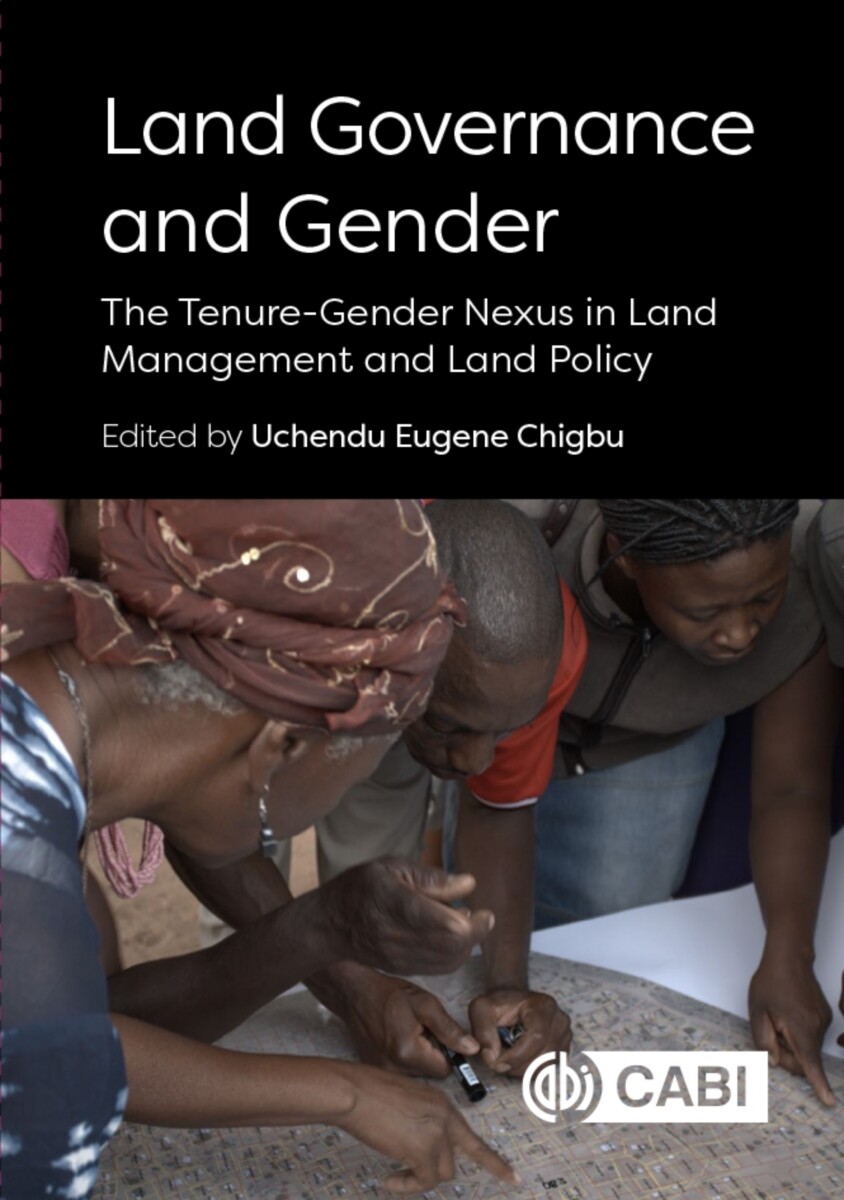Land Governance and Gender
The Tenure-Gender Nexus in Land Management and Land Policy
- Publisher
CABI - Published
22nd December 2021 - ISBN 9781789247664
- Language English
- Pages 248 pp.
- Size 6" x 9"
This book delivers new conceptual and empirical studies surrounding the design and evaluation of land governance, focusing on land management approaches, land policy issues, advances in pro-poor land tenure and land-based gender concerns. It explores alternative approaches for land management and land tenure through international experiences. Part 1 covers Concepts, debates and perspectives on the governance and gender aspects of land. Part 2 focuses on Tenure-gender dimensions in land management, land administration and land policy. It deals with land issues within the interface of theory and practice. Part 3 covers Applications and experiences: techniques, strategies, tools, methods, and case studies. Part 4 focuses on Land governance, gender, and tenure innovations. Case studies discussed include China, Ethiopia, Ghana, Lesotho, Germany, Mexico, Mozambique, Rwanda, South Korea, etc. Themes include Islamic tenure, reverse migration, matriarchy/matrilineal systems, structural inequality, tenure-responsive planning, land-related instabilities and COVID-19, urban-rural land concerns, women's tenure bargaining, tenure-gender nexus concerns in developing and developed countries.
This book:
- Includes theoretical or empirical studies on land governance and gender from a diverse group of countries
- Provides the basis for a new land administration theory to be set against conventional land administration approaches
- Offers, in an accessible manner, a range of new tools for design and evaluation of land management interventions.
1: Introducing Land Governance and Gender in the Context of Land Tenure
Part 1: Concepts, debates and perspectives on the governance and gender aspects of land
2: Gender, Structural Inequality, and Just Governance
3: Land tenure and the nuanced gender debates in sub-Saharan Africa: realities and illusions
4: Land Governance and Gender in Support of the Global Agenda 2030
5: Governing African land in an era of instability
Part 2: Tenure-gender dimensions in land management, land administration and land policy
6: Advancing Women’s Position by Recognising and Strengthening Customary Land Rights: Lessons from Community-Based Land Interventions in Mozambique
7: Women’s Insights on Bargaining for Land in Customary Tenure Systems: Land Access as an Individual and Collective Issue
8: Gender-Sensitivity in Land Management: Trajectory of Housing, Agriculture and Land Ownership in South Korea
9: Analysing Non-Legal Barriers to Land Ownership by Women
Part 3: Applications and experiences: techniques, strategies, tools, methods, and case studies
10: The Evolvement of Land Consolidation in Rural China from the Perspective of Governing Tension between Construction Land Expansion and Farmland Protection
11: Discourse on women and land tenure in Ghana: Does a matrilineal land tenure system make a difference for women?
12: The Gender Dimensions of Land Tenure Reforms in Ethiopia 1995-2020
13: The Paradox of Islamic Land Governance and Gender Equality
Part 4: Land governance, gender, and tenure innovations
14: Transforming Legal Status of Customary Land Rights: What this Means for Women and Men in Rural Africa
15: Women and Land Inheritance under Legal Pluralism in Lesotho
16: Tenure Responsive Zoning Regulations for Better Gender Equality in Land Management in Kigali city, Rwanda
17: New hope and future for rural areas under COVID-19 circumstances? Rural development, pandemic liveability, and reverse migration
18: Using Urban Literacy to Strengthen Land Governance and Women’s Empowerment in Peri-Urban Communities of San Andrés Cholula, Mexico
19: Land governance and gender for a tenure-responsive future
Uchendu Eugene Chigbu, PhD
Uchendu Eugene Chigbu is an associate professor of Land Administration at Namibia University of Science and Technology, Namibia, Africa. He has broad educational experiences that cover the social, management, environmental, and engineering sciences. His work focuses on researching, developing, and teaching transformative pathways to development through land tenure security, land-use planning, and land policy and governance improvements. He has managed international multi-stakeholder projects co-funded by the UN-Habitat, GIZ, and International Social Science Council (now International Science Council). His most impactful work is the book, Tenure Responsive Land Use Planning: A Guide for Country Level Implementation, which has been endorsed by the German Development Agency (GIZ) and the UN-Habitat for piloting in the Global South. The book emerged from a project on land-use planning and land tenure, which involved research activities in Angola, Brazil, Chile, Ivory Coast, DR Congo, Ethiopia, Ghana, Nigeria, The Philippines, and Zambia. He is a reviewer for more than 10 international journals and has supervised over 30 postgraduate theses on various land-related topics in urban and rural contexts. He is currently the Co-Chair of the International Research and Training Cluster of the Global Land Tool Network (of UN-Habitat).


